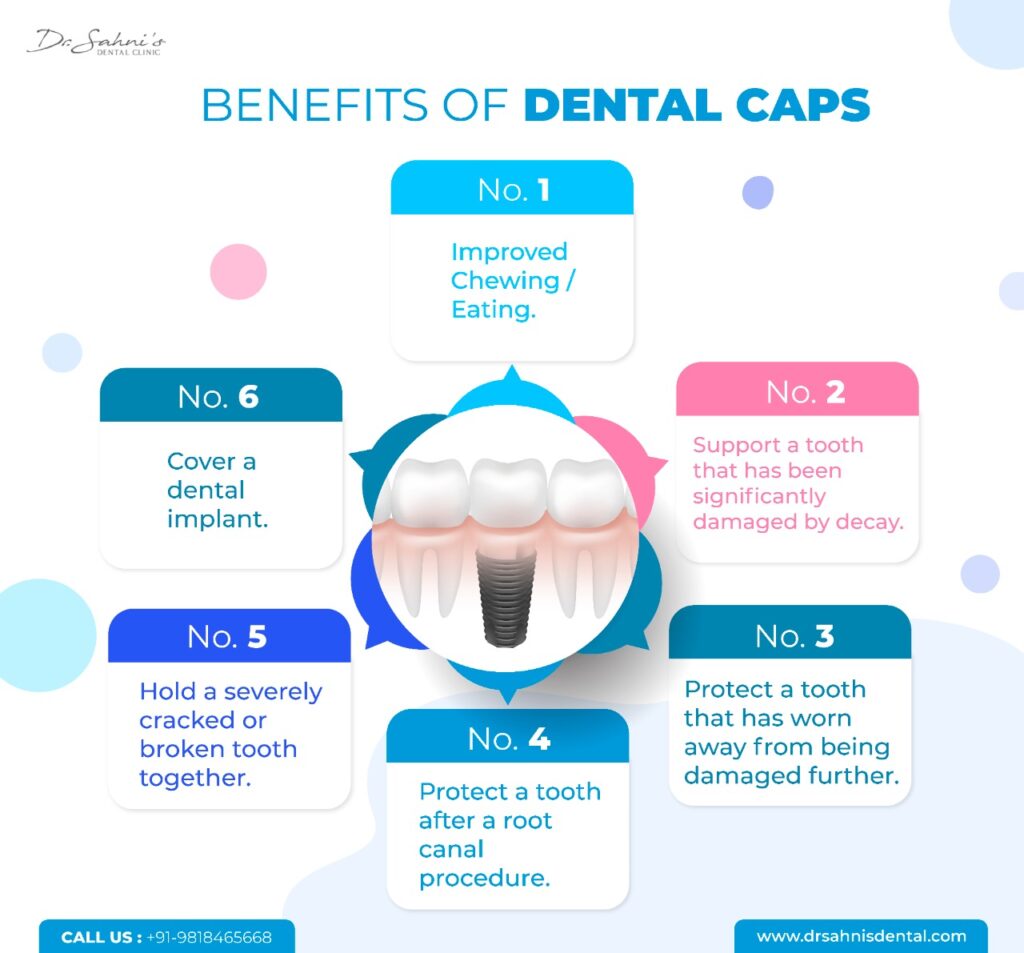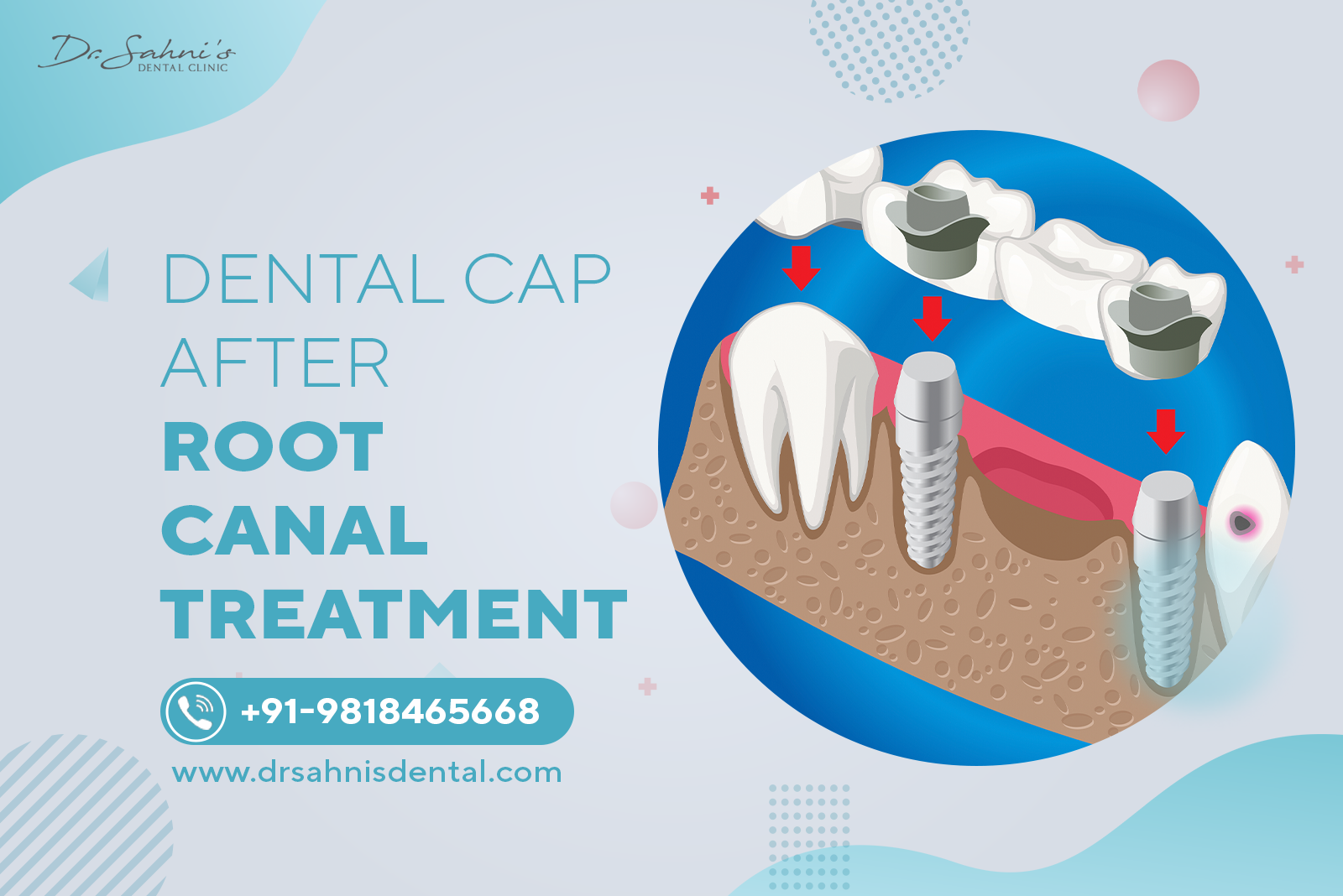The awareness regarding dental or oral health is quite low. The maximum number of dental problems can be easily taken care of with regular and dedicated oral care. This article will comprehensively deal with the Dental cap or Crown importance and its procedure in this article. To get an oral checkup done, you can contact the Dental Clinic in South Delhi and seek the best possible guidance from the experts. The article throws light on Teeth Cap’s importance and why it is necessary after root canal treatment. The procedure of placing it along with its various types is covered as well.
Table of content
Feel free to skip ahead if one topic catches your eye:
- What is a Dental Cap?
- Why is Capping necessary after Root Canal Treatment?
- When is a dental cap not required?
- Types of cap And their cost
- Tooth Capping Procedure
- How long does the RCT last with or without a crown?
What is a Dental Cap?
Commonly known as Dental Crowns, Dental caps are typically placed on top of the damaged teeth. They are used as a protective cover to help restore the teeth’ shape when the normal fillings do not solve the problem. To make Dental Caps, metals such as ceramics, resin, and porcelain are used. Dental Clinic in South Delhi can be contacted to gather more clarity and information on dental caps. To maintain the Dental Caps, no special care is required. Good oral hygiene would alone help to preserve the Dental caps or crowns. One question that the patients always ask Is capping necessary after RCT?
The articles in detail cover the importance and application of dental caps. It covers the pricing and the necessity of it. After reading the article, the patient will have a clear idea about Dental caps or crowns. Read along to find more information on Dental Caps.
Why is Capping necessary after Root Canal Treatment?
Many patients, after having a root canal, need a Root Cap fixed. The root canal becomes necessary when decay or disease enters into the nerve or the soft central portion of the tooth. While doing root canals, the dentist removes the infected and bad part of the tooth’s nerve. An artificial nerve is placed during a root canal. But during Capping, additional crowns or caps are fitted after the root canal treatment as extra protection or final sealing of the treated tooth. There are various root canal cap types, and the main reasons for Root Capping have been provided below-
- Avoid Fracture: The root cap provides extra support to the tooth, which was weakened by infection. If the cap is not fitted after the root canal treatment, the tooth becomes prone to fracture, and the tendency to breakage increases within three years.
- The capping is also done to prevent any kind of re-infection from further bacterial attack. The crown or cap serves as extra protection to the teeth. With increasing awareness, root canal treatment in Delhi is gaining immense popularity. The root caps also help in overcoming problems of Bruxism.
- The caps or the crowns are made with the same precision. They have a more realistic look with the same shape, color, and appearance as the original teeth. Since they are stain restraints and are made up of porcelain, they provide the utmost comfort to the patient. Thus, helping to improve oral health and aesthetics.
To get more details about the artificial tooth cap, the Dental clinics can be contacted.
| Also Read: Myths and Facts about Root Canal Treatment|
When is a dental cap not required?
Dental caps or crowns are required for several reasons. While some require a temporary crown after the root canal, some require a permanent one. Here are some situations that generally require dental cap-
- The root caps are required to protect the tooth from decay or cracking.
- They help in holding the dental bridge in place.
- The caps act as a protection for the tooth that has been treated with a root canal.
- A severely worn-out tooth can also be covered and protected using a root cap.
However, the patient does not require a root canal if they have a perfect pair of healthy teeth. To get a better idea, the patient can search for the Laser root canal treatment in Delhi.

Types of cap and their cost
Depending on the patient’s requirement and preference, there are various types of root canal caps. The variuos kinds of Tooth Crowns or Caps are listed below-
- Temporary: The Temporary crowns are mainly made from stainless steel or acrylic-based material. Unlike permanent caps, this kind of cap is less expensive, and a temporary crown after root canal is quite common.
- To protect the filling or tooth, stainless steel is often used in the making of the caps. When it comes to children’s oral health, this kind of stainless steel crown is chiefly used. To better understand the cost of cap after root canal, one can contact the Dentist.
- The metal crowns are also quite popular in the present days. Alloys with platinum or gold content or base-metal alloys such as nickel-chromium or cobalt-chromium are used to make artificial tooth caps. The caps made up of metals have better durability and can cost somewhere between $600 and $2500.
- When it comes to aesthetics, porcelain-infused metals are used in making tooth caps. They have an advantage when it comes to matching the neighboring teeth’ color. However, the 2 cap after the root canal, made of porcelain-infused metals, does not have longer durability. They are prone to damage and breakage.
The average cost of Tooth caps in India is approximately 10,000 INR to 20,000 INR. However, the price of the tooth caps can depend upon multiple factors such as metal used, the requirement and demand of the patient, and other factors. To better understand, the clinics that offer Laser root canal treatment in Delhi can be contacted.
Tooth Capping Procedure
Depending on the condition of the tooth the patient requires, the dentist either opts for a same-day or multi-day procedure. The patients can visit the Dental Clinic for their oral check-ups.
Read along to find more about the tooth capping procedure.
The Multi-day procedure is chiefly done with a temporary crown. The root canal treatment in Delhi clinics offers the patients with utmost care and precision. The steps involved are-
- The X-ray of the tooth is done to understand the tooth’s position and condition in a better way.
- The dentist then removes the outer layer of the tooth, and an impression is made for the trimmed tooth.
If a temporary crown after root canal is placed, the patient ideally needs a minimum of two visits to the clinic in a year.
In the same-day procedure, the dentist takes a digital picture of the mount, and the process is usually completed within 1-2 hours. The tooth crown gets ready within a time of 2 to 4 hours. During the Laser root canal treatment in Delhi, the same procedure is followed.
How long does the RCT last with or without a crown?
To save an infected tooth, one of the last resorts is getting a root canal done. When compared to natural teeth, the artificial tooth cap is weaker. Generally, a root canal lasts for at least 10-15 years. However, after root canal treatment, the longevity of the tooth increases. Adding a cap or a crown to the teeth adds extra durability and strength to the tooth.
To ensure oral hygiene, one should visit the Dental Clinic semi-annually. Regular visits are important to keep pace with oral hygiene. Apart from that, daily floss and brush will help to keep the tooth healthy.
Takeaway:
Dr. Sahni’s Dental Clinic is considered as the best dental clinic in South Delhi. The clinic is equipped with best-in-class equipment and the latest machines. Headed by Dr. Radhika Sahni, the clinic will cater to your dental problems and will be catered to with great care and expertise. The group of experts will help and guide the patient with utmost care and affection. For Laser root canal treatment in Delhi, the patient can connect with Dr. Sahni’s Dental Clinic, where all your dental problems will be catered to with great care and expertise.
